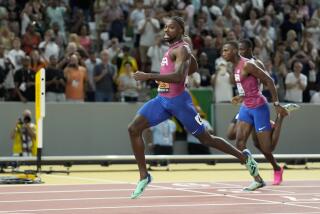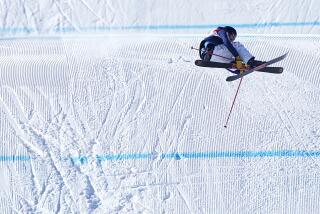Austrian Is King of Hill : Skiing: Ortlieb is first out and first at the finish. Kitt is satisfied with placing ninth.
- Share via
VAL D'ISERE, France — All’s right with the skiing world again. Austria is No. 1 in the downhill, and an American is back in the pack--but far from disgraced.
Patrick Ortlieb became the toast of Vienna Sunday when he finished just as he started, first. AJ Kitt, after an intense buildup as one of the United States’ few hopes for a medal in these 16th Winter Olympics, wound up ninth.
Kitt, at least, was not surprised. “I’m satisfied with my result,” he said. “I had a solid run. I was going for it all the way, and when you do that, sometimes you make mistakes. There was no big mistake, just a bunch of little ones.
“I definitely thought I had a chance. Just because everyone kept saying I could win a medal, and I didn’t, it doesn’t mean the day was a total loss. The course had too many turns for my taste, but Ortlieb showed he could handle it, even though he’s a classic-style downhiller. I’m not surprised he finally won; he’s been skiing better and better, and I’m happy for him.”
On a perfect day for racing, sunny and not too cold, Ortlieb gave his country its first Olympic downhill gold medal since 1980; Franck Piccard gave the host nation its first chance to go crazy by taking the silver, and Guenther Mader gave the Austrian ski industry an additional lift as he picked off the bronze.
Piccard, Mader and fourth-place finisher Markus Wasmeier of Germany are all considered to be more proficient in the super-G and giant slalom events, so their success on the Bellevarde course was somewhat predictable.
France’s Piccard, the 1988 Olympic super-G gold medalist, who was skiing in the second group of 15 Sunday, said: “This course is the future of downhill.”
To which Ortlieb replied emphatically: “No, no. It is not the future, it is too slow. I hope I will never have to race on this course again.”
The 24-year-old native of Lech, Austria, who drew the No. 1 starting position, said he made “a slight mistake at the top of the course,” but added: “After that, I skied a perfect race.”
His time of 1:50.37 down the 1 3/4-mile course, on which he reached speeds in excess of 70 m.p.h., withstood every challenge.
Piccard came within .05 of a second as he knocked Mader, who had started No. 14, into third place, another .05 back. Wasmeier, who was within reach of the bronze until Piccard came down, ended up .25 behind the winner.
“I knew I had a good time and wouldn’t have to be ashamed, but I didn’t know how good it was until later,” Ortlieb said. “I just had to wait in the finish area for the other racers to come down. But I would rather wait there than at the start, where you hear what the others have done, and worry if you can go faster.”
Ortlieb, who stands 6 feet 2, weighs 200 pounds and wears long, blond sideburns, breathed more easily when Kitt, starting No. 15 as the last of the first seeds, could do no better than 1:51.98. But the Austrian said: “I knew there were three strong skiers in the second group (Piccard, Marc Girardelli and Paul Accola), so I was not the winner yet.”
It didn’t take long. Girardelli, the four-time World Cup overall champion from Austria via Luxembourg, skied off the course about halfway down; Accola, the current World Cup leader from Switzerland, followed suit, and Piccard fired but fell a few ticks short.
Piccard, who has had mixed results since his gold medal at Calgary in ‘88, said he felt no extra pressure racing in front of his countrymen.
“I could feel their support,” he said. “Of course, I could not hear them cheering, under my helmet, but as I came down I could see them moving and waving. It helped me to ski a good time. My medal is a thank-you for their support.”
Chief victims of the Austrian uprising were the Swiss, who have dominated downhill racing in recent years, and they have only one of themselves to blame--Bernhard Russi, who won the downhill for Switzerland in the 1972 Winter Olympics at Sapporo, Japan.
Russi designed this course that was being used for the first time in international competition, and late Sunday, two of his compatriots, Franz Heinzer and Daniel Mahrer, were reportedly scouring the Savoy for him.
Heinzer, the 1991 world downhill champion and current No. 1-ranked downhiller, finished sixth in 1:51.39. Mahrer, rated No. 2 worldwide in the event, was 13th in 1:52.39, more than two seconds behind Ortlieb.
U.S. Alpine Director Dennis Agee put the race in perspective when he said: “There were a lot of unhappy classic downhillers here today, except for Ortlieb, who got the job done in spite of everything.”
As for Kitt, the Bruce Willis look-alike from Rochester, N.Y., who falls into the “classic” category but was relatively happy, Agee said: “AJ is right on track. He’ll be fine. There are more downhills left on the World Cup schedule, and he’s going to wind up among the top three.”
At least, ninth place marked an improvement over the last Olympics four years ago, when Kitt, then 19, finished 26th but was still the top American. Also, this time, two other U.S. racers bettered that placing as Kyle Rasmussen, 23, of Angels Camp, Calif., came in 16th and Tommy Moe, 22 next week, of Palmer, Alaska, ended up 20th.
All in all, it’s not too bad a start for the Americans toward 1994 and the next Olympic downhill at Lillehammer, Norway.
In the meantime, turn up the volume on that Strauss, and raise high the schnapps. The land of Toni Sailer, Karl Schranz and Franz Klammer is supreme once more throughout the Alps.
More to Read
Go beyond the scoreboard
Get the latest on L.A.'s teams in the daily Sports Report newsletter.
You may occasionally receive promotional content from the Los Angeles Times.







